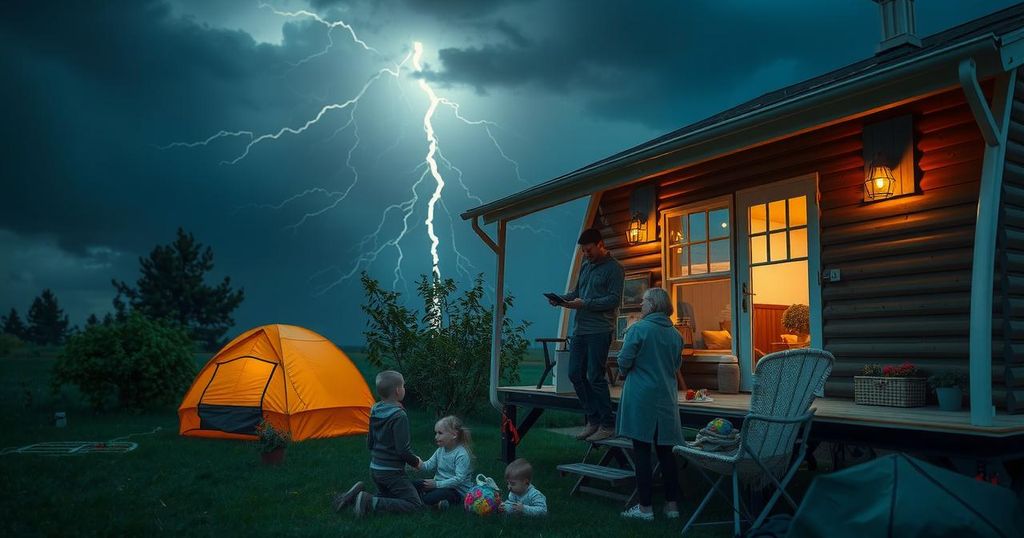Prepare for Hurricane Season: Safeguarding Your Family Amidst Increasing Storm Threats
The article highlights the increased threat of hurricanes this season, noting a forecast of up to 24 named storms with several expected to reach major hurricane status, driven by rising ocean temperatures due to climate change. Experts emphasize the importance of preparation and awareness to ensure family safety in light of the imminent storms.
Prepare for Hurricane Season: Safeguarding Your Family Amidst Increasing Storm Threats KINGSTON, R.I. (Ivanhoe Newswire) – The aftermath of Hurricane Helene has resulted in a tragic loss of life and substantial destruction across the southern regions of the United States. Alarmingly, meteorological experts observe a rise in strength among storms developing in the Atlantic. The trend of increasingly severe superstorms raises concerns regarding their potential transition from atypical occurrences to regular phenomena. Historically warm ocean temperatures, from the coast of Africa extending to the Gulf of Mexico, have contributed to this year’s predictions by the National Oceanic and Atmospheric Administration (NOAA), forecasting as many as 24 named storms and the possibility of seven becoming major hurricanes. As of now, eight named storms have been recorded, with two months remaining in the hurricane season, indicating that citizens still have time to prepare and safeguard their families. In a striking record, Hurricane Beryl became the earliest category five hurricane documented in the Atlantic this past July. Experts suggest that further intense hurricanes are imminent, as climate change exacerbates elevated ocean temperatures. University of Rhode Island Oceanographer Isaac Ginis emphasizes the enduring consequences of our carbon emissions, stating, “Even if we stop emitting carbon dioxide today, it will take 10, 15 years for the climate to get back, back to normal.” He cautions that without significant changes, it may take centuries for global temperatures to stabilize. In response, meteorologists are utilizing advanced technological methods to gather data and produce accurate storm forecasts. Ginis further elaborates on the dynamics between hurricanes and ocean temperatures, noting that warmer seas contribute to the formation of more intense hurricanes, while those hurricanes can in turn cool the ocean waters beneath them. He warns that it is not solely the higher-category hurricanes that pose threats; slower-moving hurricanes of lower categories may bring about catastrophic flooding. As he states, “Six inches of water can knock down an adult or two feet of moving water can essentially sweep away a vehicle.” To ensure the safety of your family during storm season, it is imperative to take proactive measures: prepare adequately prior to a storm, remain indoors during the event, and stock up on necessary supplies post-storm. Ginis firmly asserts, “There is no reason and justification to die during the storm these days. They just need to heed the warning and listen to the forecasters.” Hurricane season is ongoing until November 30. For comprehensive guidance on preparing homes and businesses for impending storms, individuals are encouraged to visit http://www.ready.gov/. Additionally, the FEMA app offers tailored disaster resources to assist families in effectively managing natural disasters.
The article discusses the escalating threat of hurricanes, especially in light of recent events such as Hurricane Helene which caused significant destruction. It outlines the record sea temperatures affecting storm patterns and emphasizes the need for preparedness in response to an increase in named storms, predicted by NOAA, as a consequence of climate change. The insights provided by experts, particularly university oceanographers, highlight the long-term impact of carbon emissions on climate stabilization and storm intensity, offering valuable knowledge for families seeking to ensure safety during storms.
In summary, the article stresses the urgency for families to prepare for the hurricane season amid rising storm threats fueled by climate change. With predictions indicating a high number of storms and their potential severity, the advice from meteorological experts is crucial for public safety. By adhering to preparedness protocols and staying informed through resources like NOAA and FEMA, families can enhance their resilience against natural disasters.
Original Source: www.walb.com




Post Comment